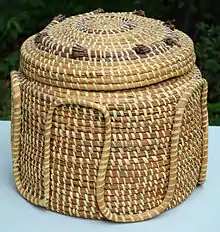Edda L. Fields-Black
Edda L. Fields-Black (born Edda L. Fields) is an African-American historian who is currently associate professor of history at Carnegie Mellon University. She is known for her research on West African rice agriculture and societies[1] and the African diaspora.
Edda L. Fields-Black | |
|---|---|
| Nationality | American |
| Occupation | Historian |
| Spouse | Samuel Black |
| Academic background | |
| Alma mater | University of Pennsylvania |
| Thesis | Rice farmers in the Rio Nunez region: A social history of agricultural technology and identity in coastal Guinea, ca. 2000 BCE to 1880 CE (2001) |
| Academic work | |
| Institutions | Carnegie Mellon University |
| Main interests | West African rice agriculture and anthropology, Gullah history and culture, Rio Nunez languages |
| Notable works | Deep Roots: Rice Farmers in West Africa and the African Diaspora (2008) |
| Website | fieldsblack |
Early life
Raised in Miami, Fields-Black grew up with her paternal grandparents, Jim Fields and Mamie Fields, who were Gullah speakers from Green Pond, South Carolina.[2]
Education
Fields-Black earned a BA degree in English and History from Emory University and an MA degree in history from the University of Florida, before earning MA and PhD degrees from the University of Pennsylvania, where she wrote her dissertation on the anthropology of rice farmers in the Nunez River region of Guinea.[3][4]
Research
Apart from her research on rice agriculture in coastal Guinea and Sierra Leone, Fields-Black has also performed research on the Gullah Geechee people,[5] the Trans-Atlantic slave trade, and other topics in African-American history.[6]
Fields-Black is also known for her work on the Rio Nunez languages, Nalu language, Mel languages, and other Atlantic languages of West Africa.[7]
Publications
Fields-Black's books include Deep Roots: Rice Farmers in West Africa and the African Diaspora and the co-edited volume Rice: Global Networks and New Histories.[8][9] She is currently completing a study on Harriet Tubman during the Civil War, enslaved Lowcountry rice laborers, and the Combahee River Raid.[10]
- Fields-Black, Edda L. Deep Roots: Rice Farmers in West Africa and the African Diaspora. (Blacks in the Diaspora.) Bloomington: Indiana University Press, 2008.
- Bray, Francesca, Peter A. Coclanis, Edda L. Fields-Black, and Dagmar Schäfer. Editors. Rice: Global Networks and New Histories. New York: Cambridge University Press, 2015.
Personal life
She is married to Samuel Black, a historian, curator, and archivist who is director of African-American programs at the Senator John Heinz History Center.[11] The pair was featured together in an episode of StoryCorps in 2006; Samuel talks to Edda Fields-Black about his relationships with his father and work throughout the episode, which aired on NPR's Morning Edition.[12]
References
- "Unburied, Unmourned, Unmarked: Requiem for Rice" September Tour of West African Rice Fields. Requiem for Rice.
- Edda L. Fields-Black biography.
- Edda L. Fields Black. Pittsburgh Foundation.
- Fields, Edda. 2001. Rice farmers in the Rio Nunez region: A social history of agricultural technology and identity in coastal Guinea, ca. 2000 BCE to 1880 CE. Doctoral dissertation. Philadelphia: University of Pennsylvania.
- The Gullah Geechee people.
- Edda Fields-Black. Carnegie Mellon University Center for the Arts in Society.
- Fields, Edda L. Before "Baga": Settlement Chronologies of the Coastal Rio Nunez Region, Earliest Times to c.1000 CE. In: The International Journal of African Historical Studies, Vol. 37, No. 2 (2004), pp. 229-253. Boston University African Studies Center.
- Neimark, Jill (May 10, 2017). A Lost Rice Variety — And The Story Of The Freed 'Merikins' Who Kept It Alive . NPR.
- O'Driscoll, Brian. (Feb 12, 2019). Symphonic Work In Pittsburgh Honors Enslaved Africans On Rice Plantations. WESA FM.
- Edda L. Fields-Black. Department of History, Carnegie Mellon University.
- Rutkoski, Rex (Feb 16, 2013). History center's Samuel Black has found his calling. Trib Live.
- "Samuel Black and Edda Fields-Black". storycorps.org. Retrieved 2020-07-24.
External links
- Personal website
- Faculty page at Carnegie Mellon University

